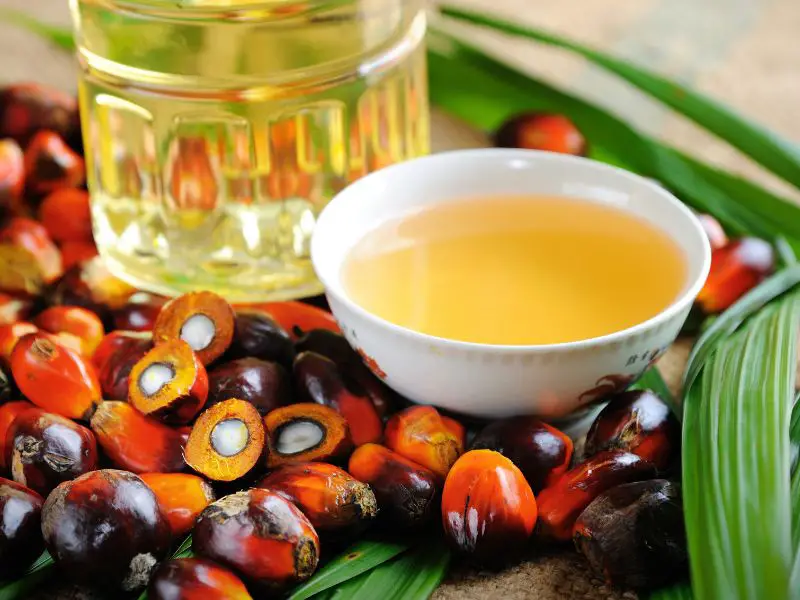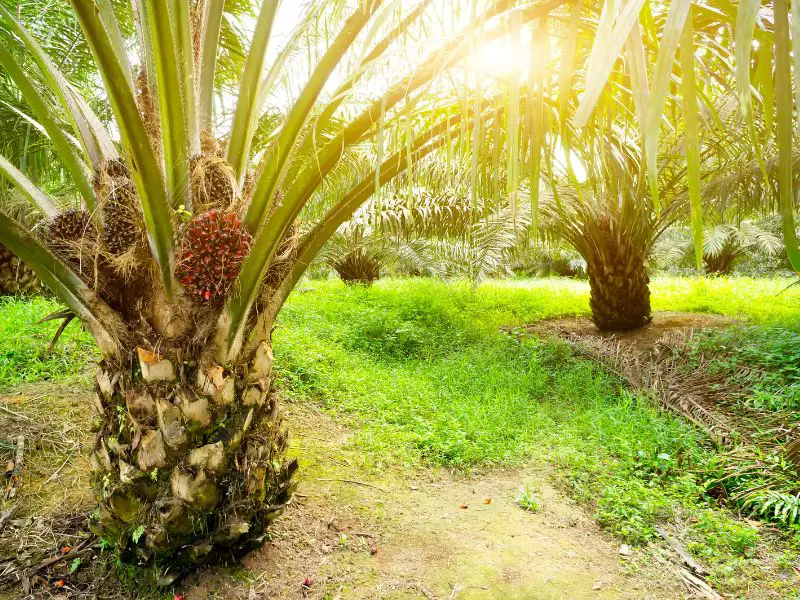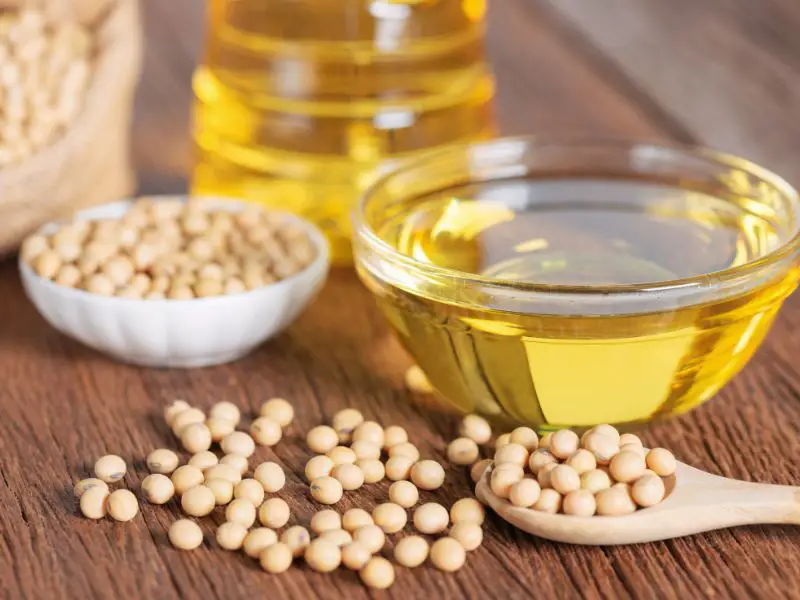Oil trees, namely vegetable oils, have been utilized for thousands of years. Since their discovery, plants have offered a healthful alternative to animal-derived oils, carrying almost no cholesterol. In today’s article, we will discuss some benefits of using plant oils and their derivatives for skin and hair care.
Oils Derived from Oil Trees
Pressing seeds often extract oils from vegetables, although in other situations, like olives and palm fruits, oils are extracted by pressing the fruit pulps themselves.

Approximately 70% of plant oil production worldwide comes from four plants: soybeans, oil palm, rapeseed, and sunflower. Among these, only sunflowers (Helianthus annuus) originate in North America.
Non-Edible Vegetable Oils
Although most vegetable oils end up in meals, substantial amounts are utilized by different industries to make non-edible items. Sunflower oil is used in various paints, varnishes, and polymers.
Linseed oil, One of the first oils produced for commercial use, is extracted from the seeds of Linum usitatissimum, an annual plant of the flax family that grows naturally in central Asia and the Mediterranean. Nearly 80% of the world’s linseed oil output is now used in the paint and varnish industries. The cultivation of flax dates back more than 5,000 years to Mesopotamia, Assyria, and Egypt, and its remains have been discovered in the garbage of Stone Age homes. Tradicional medicine also makes use of it.
Palm Oil Used for Everyone’s Cooking
Palm tree, which can only be grown in tropical climates, yields premium oil primarily used for cooking in different nations. Additionally, it is used in detergents, cosmetics, biodiesel, and culinary goods. Although palm oil only makes up a minor portion of the typical American diet, it is included in more than half of the packaged goods they use daily, including ice cream, lipstick, soap, and laundry detergent.

Palm oil is a high-yielding crop. It produces a much higher output at a cheaper cost than other vegetable oils. You can see this in the ever-ending expansion quickly over the world. Plantations are increasing in Asia, Africa, and Latin America. But as a consequence, vegetable oil developments threaten tropical forests, which provide crucial habitats for many endangered species and a lifeline for certain human groups.
Negative Impact of Vegetable Cooking Oils
1. Fatty Acids Modern Diet
Today’s modern diets often contain many trans-fatty acids – also known as partially hydrogenated fats – produced by adding hydrogen to liquid oils to make them more solid at room temperature. These fats are thought to increase the risk of coronary heart disease by interfering with the body’s ability to use dietary cholesterol effectively. This increasing consumption of trans-fatty acids is believed to be the leading cause of heart disease in the United States today.
2. Oil Tree Plantations Are the Top Cause of Biodiversity Loss
Clearing forests to plant these trees drives extinction rates massively upward. Most tropical rainforests have been converted to farmland to produce animal feed or palm oil for biofuels. Vegetable oil crops, such as soybean and palm oil, are two of the top three causes of global deforestation, accounting for roughly one-fifth of tropical deforestation globally. When plantations outgrow their soil fertility, they frequently resort to chemical fertilizers to grow more, leading to double damage.

3. Affects Almost Half of Threatened Mammals and Birds
Regarding endangered species, the International Union for the Conservation of Nature (IUCN) says that expanding palm oil production might impact more than half of the world’s vulnerable animals and two-thirds of the world’s threatened birds. However, the IUCN claims that “replacing it is not a solution” due to the poor yields of other vegetable oil crops compared to palm oil.
While palm oil is often condemned for its destructive effects on tropical forests, it is the most prolific oil tree.
The issue with palm oil is that it directly competes for land with biologically diverse and carbon-rich tropical forests, which account for 2% of the Earth’s surface and are home to 50% of our plant and animal species, endangering species and emitting tons and tons of greenhouse gasses.
4. Vegetable Oils Provide Minor Nutrition per KG
Vegetable oils represent up to 30% of worldwide agricultural fields yet provide less than 0.01% of our needed essential nutrients.
Unfortunately, even vegetable oils like avocado and olive oil, thought to be healthier, have severe environmental and social problems. Most avocado oil produced in Mexico is mainly controlled by cartels stealing farmland and destroying protected woods to grow their fruit groves.

While certain short-term environmental compromises may be required to feed the world’s rising population, we should not burn down our rainforests, destroy biodiversity, and hasten global warming to produce foods that poison us.
5. Local Populations Lose Their Homes and Livelihoods
Not only does the ecosystem suffers significantly as a result of unsustainable palm oil production. Not only are vulnerable creatures being pushed from their natural habitats. The local people who dwell on these lands are losing their houses and means to live.
In areas where palm oil plantations are being established, tales of illegitimate land grabs and human rights violations are all too familiar. Unfortunately, the state often disregards the traditional land rights of indigenous people. As a result, the government turns up its lands to oil palm production businesses.
Human rights abuses and illegal land grabs are common in palm oil plantations. Governments usually use public force to allow oil palm companies to expand their plantations by clearing forests and evicting people from their homes. A little care can go a long way in helping save our rainforest and the lives of so many animals while also helping keep our planet to become sustainable.
Bottomline
Vegetable cooking oils are helpful but must be consumed in moderation as they can cause various health problems like obesity or high cholesterol. If used wisely, they can play a big part in keeping you healthy. At the same time, however, they are bad for the environment as they rely heavily on pesticides and other chemicals and contribute to deforestation. Hence using them in moderation is very important to avoid adverse side effects both for your health, and the environment. Thanks for reading!
Looking for a wild ride in the world of nutrition? Our guide has got you covered with a fun and quirky mix of topics. From the controversial carnivore diet to the surprising benefits of wild eggs, we’ll explore the latest trends in nutrition. And for those with dietary restrictions, we’ll even show you how to indulge in a sweet treat with nut-free candy corn. Get ready to expand your culinary horizons and have some fun with our guide to nutrition!

